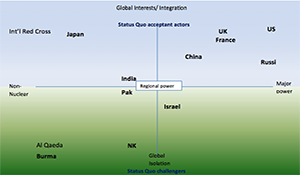Understanding the Concept of Nuclear Targets: A Comprehensive Analysis
Related Articles: Understanding the Concept of Nuclear Targets: A Comprehensive Analysis
Introduction
With enthusiasm, let’s navigate through the intriguing topic related to Understanding the Concept of Nuclear Targets: A Comprehensive Analysis. Let’s weave interesting information and offer fresh perspectives to the readers.
Table of Content
- 1 Related Articles: Understanding the Concept of Nuclear Targets: A Comprehensive Analysis
- 2 Introduction
- 3 Understanding the Concept of Nuclear Targets: A Comprehensive Analysis
- 3.1 Defining Nuclear Targets: Beyond Physical Locations
- 3.2 Types of Nuclear Targets: A Categorical Overview
- 3.3 The Significance of Nuclear Targets: A Multifaceted Analysis
- 3.4 Benefits of Nuclear Targets: A Controversial Discussion
- 3.5 Frequently Asked Questions about Nuclear Targets: Addressing Concerns
- 3.6 Tips for Understanding and Addressing Nuclear Targets: A Practical Guide
- 3.7 Conclusion: A Call for Peace and Disarmament
- 4 Closure
Understanding the Concept of Nuclear Targets: A Comprehensive Analysis

The concept of "nuclear targets" evokes a sense of dread and fear, conjuring images of unimaginable destruction. While the term itself is often associated with military strategy and the potential for global catastrophe, its true meaning extends beyond mere physical locations. This article delves into the complexities of nuclear targets, exploring their significance, potential benefits, and the ethical considerations surrounding their use.
Defining Nuclear Targets: Beyond Physical Locations
A nuclear target, in its simplest definition, is any location that could be targeted by a nuclear weapon. This definition, however, is far too simplistic. To understand the true nature of nuclear targets, we must consider the broader context:
- Strategic Importance: Nuclear targets are not chosen randomly. They are carefully selected based on their strategic significance. This can include military bases, industrial centers, government buildings, or even civilian populations.
- Political Context: The selection of nuclear targets is often influenced by political considerations. For instance, a nation might target a specific city to cripple its enemy’s economy or weaken its political will.
- Military Doctrine: Each nation’s military doctrine dictates the types of targets it would consider for nuclear attack. This doctrine is shaped by factors such as national security interests, perceived threats, and the nature of the conflict.
Therefore, understanding nuclear targets requires analyzing not only the physical location but also the strategic, political, and military context surrounding them.
Types of Nuclear Targets: A Categorical Overview
Nuclear targets can be broadly classified into several categories:
- Military Targets: These include military bases, command centers, communication facilities, and weapons storage sites. Targeting these locations aims to cripple an enemy’s military capabilities.
- Industrial Targets: These encompass key industrial facilities such as power plants, factories, and transportation hubs. Their destruction aims to disrupt an enemy’s economy and infrastructure.
- Government Targets: These include government buildings, administrative centers, and political institutions. Targeting these aims to cripple an enemy’s governance and decision-making capabilities.
- Population Centers: Targeting civilian populations is a highly controversial strategy. It aims to instill fear and demoralize an enemy by inflicting mass casualties.
It is important to note that the categorization of nuclear targets is not always clear-cut. A single location can often fall into multiple categories. For example, a major city might be targeted due to its industrial importance, its strategic location, and its large population.
The Significance of Nuclear Targets: A Multifaceted Analysis
The concept of nuclear targets holds significant implications for various aspects of international relations, security, and diplomacy:
- Deterrence: The potential for nuclear attack serves as a powerful deterrent. By demonstrating their willingness to use nuclear weapons, nations aim to discourage potential adversaries from initiating hostilities.
- Arms Control: The existence of nuclear targets drives the need for arms control treaties and agreements. These efforts aim to limit the proliferation of nuclear weapons and prevent their use.
- International Security: The potential for nuclear conflict poses a significant threat to global security. Understanding nuclear targets is crucial for developing strategies to mitigate these risks.
- Ethical Considerations: The use of nuclear weapons, especially against civilian populations, raises profound ethical concerns. The potential for mass casualties and long-term environmental damage necessitates careful consideration of the consequences of targeting decisions.
Benefits of Nuclear Targets: A Controversial Discussion
While the concept of nuclear targets evokes negative connotations, it is important to acknowledge potential benefits:
- Deterrence: As mentioned earlier, the potential for nuclear attack serves as a powerful deterrent against aggression. It can help maintain a balance of power and prevent large-scale conflicts.
- Strategic Advantage: In the context of a nuclear war, targeting key enemy assets can give a nation a strategic advantage. This can include disabling communication networks, disrupting logistics, or hindering the enemy’s ability to wage war.
However, these benefits are often overshadowed by the immense risks and ethical concerns associated with nuclear weapons.
Frequently Asked Questions about Nuclear Targets: Addressing Concerns
Q: What are the criteria for selecting nuclear targets?
A: The criteria for selecting nuclear targets vary depending on the nation’s military doctrine and strategic goals. However, common factors include:
- Strategic Importance: The target should be of significant strategic value to the enemy, such as a major military base, industrial center, or government building.
- Military Vulnerability: The target should be vulnerable to a nuclear attack, considering factors such as its proximity to other targets, its defenses, and its potential for collateral damage.
- Political Considerations: The target’s political significance and the potential impact of its destruction on the enemy’s government and population.
Q: Is it ethical to target civilian populations?
A: The ethics of targeting civilian populations is a highly controversial topic. International law generally prohibits the intentional targeting of civilians, but the distinction between military and civilian targets can become blurred in the context of nuclear war.
Q: How can the risk of nuclear war be mitigated?
A: Mitigating the risk of nuclear war requires a multi-pronged approach:
- Arms Control: Treaties and agreements aimed at limiting the proliferation of nuclear weapons and reducing the number of warheads in existence.
- Diplomacy: Engaging in dialogue and negotiations to reduce tensions and build trust between nations.
- Non-Proliferation: Preventing the spread of nuclear weapons to new countries and ensuring the security of existing nuclear arsenals.
- Education and Awareness: Raising public awareness about the dangers of nuclear weapons and promoting a culture of peace and disarmament.
Q: What are the long-term consequences of nuclear war?
A: The long-term consequences of nuclear war are devastating and far-reaching:
- Nuclear Winter: The massive release of smoke and dust into the atmosphere could block sunlight, leading to a prolonged period of cold and darkness.
- Radiation Sickness: Nuclear explosions release harmful radiation that can cause severe health problems, including cancer and birth defects.
- Environmental Damage: Nuclear explosions can cause widespread environmental damage, including contamination of land, air, and water.
- Economic Collapse: Nuclear war could lead to widespread economic collapse, disrupting trade, transportation, and infrastructure.
Tips for Understanding and Addressing Nuclear Targets: A Practical Guide
- Stay Informed: Keep yourself informed about the latest developments in nuclear weapons technology, arms control negotiations, and international security issues.
- Engage in Dialogue: Discuss nuclear weapons and their implications with friends, family, and community members. Encourage critical thinking and open dialogue on this important topic.
- Support Non-Proliferation Efforts: Advocate for policies and initiatives aimed at preventing the spread of nuclear weapons and promoting disarmament.
- Educate Yourself: Learn about the history of nuclear weapons, the dangers of nuclear war, and the ethical considerations surrounding their use.
Conclusion: A Call for Peace and Disarmament
The concept of nuclear targets serves as a stark reminder of the dangers of nuclear weapons and the potential for catastrophic consequences. While the use of nuclear weapons remains a significant threat, it is crucial to remember that the ultimate goal should be a world free from these weapons.
By promoting dialogue, fostering cooperation, and pursuing disarmament, we can work towards a future where the concept of nuclear targets is a relic of the past. The pursuit of peace and security demands a collective effort, one that requires understanding, empathy, and a commitment to a brighter future for all.







Closure
Thus, we hope this article has provided valuable insights into Understanding the Concept of Nuclear Targets: A Comprehensive Analysis. We appreciate your attention to our article. See you in our next article!